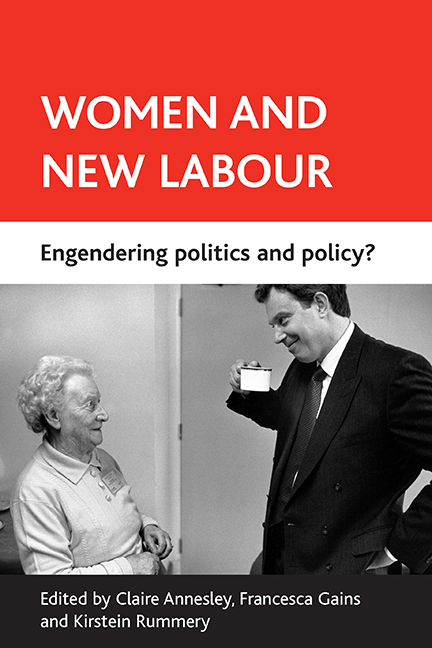eight - New Labour: family policy and gender
Published online by Cambridge University Press: 15 September 2022
Summary
Introduction
This chapter examines the coherence of New Labour's approach to the family and the implications for gender roles of its policies. Family policy is a notoriously difficult concept to define. At its most general it is ‘everything the state does to and for the family’ (Kamerman and Kahn 1978, 3) whether or not the family is the explicit object of those state activities. Under a more limited definition family policies may be defined as ‘policies that identify families as the deliberate target of specific actions and where the measures initiated are designed to have an impact on family resources and ultimately on family structure’ (Hantrais 2004, 132). Within this broad field, the specific focus of this chapter is on those policies which have implications for parents and for the division of responsibilities for children, both between mothers and fathers, and between parents and the state.
After a brief discussion of family policy in Britain before 1997, the chapter outlines the policies introduced by the New Labour governments. It examines their effects on gender divisions in paid work and unpaid care, and their differential impact on partnered and lone mothers, and on women of different social classes. It raises some questions about the overall coherence of these policies and identifies a number of different notions of parental responsibility that underlie the policies on parenting in relation to pre-school and older children.
Family diversity and family policy
Before the early 1990s, UK governments avoided adopting any kind of explicit family policy (Kamerman and Kahn 1997); so that although policies affecting the family were informed by a set of normative values and assumptions about the family, gender roles and the relative responsibilities of state and family, these were implicit rather than explicit. There was a view, shared across the political spectrum, that the state should not interfere in the private sphere of the family, except where necessary to protect children from harm. Policies were based on an increasingly inappropriate ‘male breadwinner’ model of the family, according to which, the man provided material support and the woman was the carer. Apart from the provision of maternity leave, Britain had no state policies – such as childcare provision – to support maternal employment, or to facilitate greater paternal involvement in caring for children.
- Type
- Chapter
- Information
- Women and New LabourEngendering Politics and Policy?, pp. 155 - 174Publisher: Bristol University PressPrint publication year: 2007



